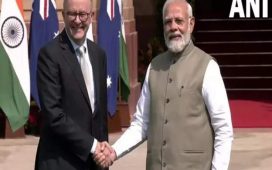A photo of Sam Altman, CEO of OpenAI.
Olivier Douliery | Afp | Getty Images
This report is from today’s CNBC Daily Open, our new, international markets newsletter. CNBC Daily Open brings investors up to speed on everything they need to know, no matter where they are. Like what you see? You can subscribe here.
What you need to know today
Wall Street up, awaits inflation data
U.S. markets advanced ahead of a crucial inflation report on Wednesday, despite April’s producer price index coming in hotter than expected. The Nasdaq rose to a record close, while the Dow Jones Industrial Average added 126 points. The S&P 500 gained almost 0.5% even as Federal Reserve Chair Jerome Powell said the central bank would need to be patience with its monetary policy given stubborn inflation. The yield on the 10-year Treasury slipped lower, and oil prices fell.
Meme craze cools
Shares of GameStop and AMC rose on Tuesday, extending Monday’s gains after “Roaring Kitty” made a reappearance. Shares, however, gave up some of their earlier gains, suggesting enthusiasm for the so-called meme stocks was fading. AMC managed to raise $250 million in new capital in the midst of Monday’s meme stock rally. AMC ended Tuesday, up 32%, while GameStop soared 60%.
Alibaba sinks
Profit at e-commerce giant Alibaba fell 86% to 3.3 billion yuan ($456 million) in its fiscal fourth quarter. The Hangzhou-headquartered company is facing rising competition at home and has been ramping up its overseas operations. Alibaba had a rocky 2023 as it restructured its business. The company’s shares fell 6% in New York.
Biden’s China tariffs
The Biden administration sharply increased tariffs on $18 billion of Chinese imports, aimed at protecting U.S. industries and jobs. Tariffs on imported Chinese electric vehicles will rise to 100% from 25%. Other products that will be hit include medical needles, syringes and ship-to-shore cranes.
Powell: Inflation falling slowly
Federal Reserve Chair Jerome Powell said inflation was not slowing as quickly as anticipated, requiring the central bank to maintain its current interest rates for longer. “We did not expect this to be a smooth road. But these [inflation readings] were higher than I think anybody expected,” Powell said in Amsterdam. “What that has told us is that we’ll need to be patient and let restrictive policy do its work.”
[PRO] Hot meme stocks
Meme stocks are back in vogue with the emergence of “Roaring Kitty.” This time, it extends beyond GameStop and AMC Entertainment. CNBC’s Yun Li takes a look at stocks causing a frenzy on Reddit forum “wallstreetbets.”The bottom line
The bottom line
Sam Altman’s OpenAI raised the bar for artificial intelligence assistants on Monday — a move that could spell the end of Siri and Alexa. In a demonstration, it effortlessly translated Italian to English on an Apple iPhone, and even solved a difficult math problem.
The demo caught the attention of analysts, especially as Apple is reportedly in talks with Google and OpenAI to incorporate their technology into its AI arsenal.
“We suspect that Apple is nowhere near, internally, to what OpenAI just demoed,” wrote Rosenblatt analyst Barton Crockett. “If Google can’t match OpenAI’s capabilities at I/O, then Apple will be under significant pressure to partner with OpenAI to modernize Siri for the current state of AI.”
Under pressure from OpenAI, Google announced its most powerful AI model on Tuesday.
It is a crucial test for Google as it goes head-to-head with OpenAI and its $10 billion backer, Microsoft. The estimated $1 trillion AI market is at stake, and Google has been caught off guard, ironically, because it has been funding and sharing much of its AI research.
Google CEO Sundar Pichai has turned to British chess master and neuroscientist Demis Hassabis to spearhead the company’s AI deployment. Hassabis co-founded DeepMind, a world-leading AI lab that Google acquired for around $500 million in 2014.
The other co-founder of DeepMind and fellow Briton Mustafa Suleyman was hired by Microsoft CEO Satya Nadella to lead the company’s consumer-facing AI products, including Copilot, Bing, and Edge.
While the United States leads in AI, it has fallen behind in electric vehicle technology. As widely reported, President Joe Biden imposed tariffs on Chinese EVs and other technology products. While China has yet to sell a single EV in the United States, luxury Chinese EV brand Zeekr raised $441 million in its U.S. IPO last week.
Washington argues Beijing is subsidizing EV makers. Ahead of Biden’s announcement, Hua Chunying, China’s Assistant Minister of Foreign Affairs, posted on X, attaching a photo with a quote attributed to Janet Yellen: “We’re explicitly subsidizing investment in these important strategic areas. We don’t want to see massive Chinese subsidies that will drive our firms out of business.”
Hua responded: “Translation: We’ll support US industries with subsidies because it’s strategic, but when others do it, it’s unfair competition.”
— CNBC’s Jeff Cox, Alex Harring, Rebecca Picciotto, Yun Li, Sam Meredith, Arjun Kharpal, Jasmine Wu, Jennifer Elias and Deidre Bosa contributed to this report.









